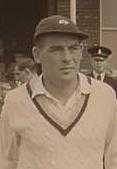Doug Padgett
 | |||||||||||||||||||||||||||||||||||||||||||||||||||||
| Personal information | |||||||||||||||||||||||||||||||||||||||||||||||||||||
|---|---|---|---|---|---|---|---|---|---|---|---|---|---|---|---|---|---|---|---|---|---|---|---|---|---|---|---|---|---|---|---|---|---|---|---|---|---|---|---|---|---|---|---|---|---|---|---|---|---|---|---|---|---|
| Full name | Douglas Ernest Vernon Padgett | ||||||||||||||||||||||||||||||||||||||||||||||||||||
| Born |
20 July 1934 Bradford, Yorkshire, England | ||||||||||||||||||||||||||||||||||||||||||||||||||||
| Batting style | Right-handed batsman (RHB) | ||||||||||||||||||||||||||||||||||||||||||||||||||||
| Bowling style | Right-arm medium (RFM) | ||||||||||||||||||||||||||||||||||||||||||||||||||||
| International information | |||||||||||||||||||||||||||||||||||||||||||||||||||||
| National side |
| ||||||||||||||||||||||||||||||||||||||||||||||||||||
| Career statistics | |||||||||||||||||||||||||||||||||||||||||||||||||||||
| |||||||||||||||||||||||||||||||||||||||||||||||||||||
| Source: | |||||||||||||||||||||||||||||||||||||||||||||||||||||
Doug Padgett (born Douglas Ernest Vernon Padgett, 20 July 1934)[1] was an English cricketer, who played more than 500 first-class matches and represented England in Tests twice, both in 1960. The cricket writer Colin Bateman recorded Padgett was, "nimble, happy anywhere in the order, he was a great technician and one of the best batsmen of his era on a bad wicket".[1]
Life and career
Born 20 July 1934, in Bradford, Padgett had an elder brother, Granville, who was also a professional cricketer. In 1951, he became the youngest player then to play first-class cricket for Yorkshire, aged just 16 years and 320 days.[1][2] Paul Jarvis broke his record in 1981.[3]
After National Service, Padgett was one of the first of a new generation of Yorkshire batsmen to cement his place in the Yorkshire first team. He scored more than 1,000 runs in 1956, and in the County Championship-winning side of 1959 he was the leading batsman with more than 2,000 runs. He usually batted at No 3, though he occasionally opened the innings.
In 1960, a tour by the South Africans, widely perceived as weak, led the England Test selectors to experiment with new batsmen, and Padgett played in the fourth and fifth matches. He was not a great success, and was one of a number of England players criticised in The Oval Test match for slow batting in the second innings.[4] He went to New Zealand the following winter on an extensive MCC tour, but he was never picked again for England. Padgett failed to convert his innings into big scores, albeit registering 50 one hundred and twenty nine times in his first-class career, Padgett only reached the century mark on thirty two occasions. This counted against him when the England selectors considered his promotion to further international duty.[1] However, he remained a valued member of the Yorkshire side that won six further Championships across the 1960s. He scored more than 1,000 runs in 12 seasons.
He retired from playing in 1971, much to the frustration of the new captain, Geoffrey Boycott, who relied on his counsel.[5][6] Padgett then captained Yorkshire's second eleven, becoming assistant, then head coach.[7] He watched the teenage Michael Vaughan for "about a quarter of an hour without saying a word", before turning to the county's Cricket Development Manager and saying, "Sign him".[8]
References
- ↑ 1.0 1.1 1.2 1.3 Bateman, Colin (1993). If The Cap Fits. Tony Williams Publications. p. 128. ISBN 1-869833-21-X.
- ↑ "Modest Doug was so exact". Telegraph & Argus. 6 January 2000. Retrieved 23 September 2007.
- ↑ Bateman, Colin (1993). If The Cap Fits. Tony Williams Publications. p. 100. ISBN 1-869833-21-X.
- ↑ Wisden Cricketers' Almanack 1961. p. 303.
- ↑ Boycs: The True Story – Leo McKinstry (2000)
- ↑ Boycott: The Autobiography – Geoff Boycott (2006)
- ↑ Martin-Jenkins, Christopher (1980). "England". The Complete Who's Who of Test Cricketers (1st edition ed.). London: Orbis Publishing. p. 98. ISBN 0-85613-283-7.
- ↑ "Vaughan ready to bloom". BBC Sport. 21 March 2001. Retrieved 23 September 2007.
External links
| Wikiquote has a collection of quotations related to: Doug Padgett |